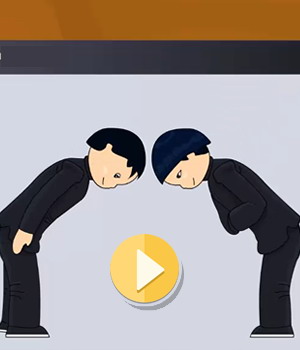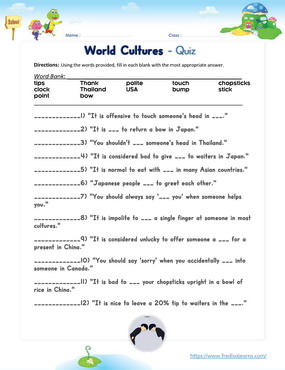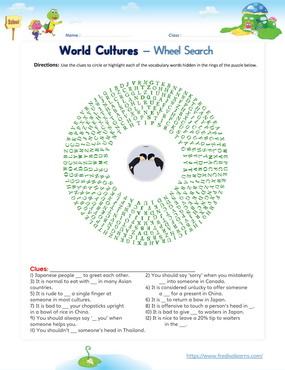Unit 8: World Cultures
Objectives:
- This ESL lesson aims to teach kids words and expressions related to different cultures.
- The lesson teaches basic cultural taboos in different countries and students learn how to give advice when visiting another country.
- The lesson’s grammar focus is on adjectives followed by ‘to’ which is part of the verb in the infinitive, and the modal ‘should/shouldn’t for making cultural recommendations.
Main Lesson Materials & Study Steps
1st –This cartoon animated video features a short dialogue, followed by vocabulary and sentence breakdown. It is essential for introducing the words, phrases, grammar, spelling and sentences of the lesson in context. Watch repeatedly to master the content. The video plays on any device.
2nd – Then the student plays this fun game after watching the video, to practice the contents of the lesson. The game reviews key vocabulary, grammar and sentences from the lessons. This game can be played on any device.
3rd – Finally the learner takes this test of the unit. The score of this test is captured in the LMS and gives educators an idea of how well their learner is doing. The test opens on any device – mobile & PC.
Worksheets for the Unit
The worksheets below are useful for offline and classroom activities. These printable exercises directly correlate with the above lesson 'World Cultures'. Every worksheet comes with an answer sheet on the second page for educators.
Already a Member?
Not a member yet?
Lesson Story:
Freddie and Bob are watching TV when a program about world cultures comes on. They learn that Japanese people bow as a form of greeting and it is polite to return a bow. Freddie and Bob find these cultural tips fun, and take turns practicing them.
Vocabulary:
Countries
| · Japan |
| · Canada |
| · China |
| · Thailand |
| · USA |
Actions
| · bow |
| · give tips |
| · touch someone's head |
| · stick chopsticks upright |
| · eat with chopsticks |
| · point your finger |
| · offer someone a clock |
Good adjectives
| · polite |
| · normal |
| · nice |
Bad adjectives
| · rude |
| · impolite |
| · offensive |
| · bad |
Cultures Sentences - Adjectives followed by infinitive 'to'
| It is polite | to bow in Japan. |
| It is normal | to eat with chopsticks in most Asian countries. |
| It is rude | to stick your chopsticks upright in a bowl of rice in China. |
| It is polite | to say sorry when you bump into someone in Canada. |
| It is rude | to touch someone's head in Thailand. |
| It is impolite | to point your finger at someone in most cultures. |
| It is offensive | to give tips to waiters in Japan. |
| It is nice | to leave a 20% tip to waiters in the USA. |
| It is bad | to offer someone a clock for a present in China. |
Be a culture expert - Advice using 'should' & 'shouldn't'
| You should bow when someone bows to you in Japan. |
| You should say sorry when you bump into someone in Canada. |
| You shouldn't touch someone's head in Thailand. |
| You shouldn't point your finger at someone. |
This lesson is part of the Level 7 English course.














